The 7 Sages of Ancient Greece was the special title that was given by Greek tradition to the seven wise men in the ancient Greece who were statesmen, law-givers, and philosophers. They are also acclaimed for their practical wisdom that consisted of memorable dicta and pithy.
According to the Pittacus Lore, Seven of the Elders traveled to Greece where they introduced the place to more advanced methods of thinking and worked to put an end to the war plaguing it back then. They were called as the Seven Sages of ancient Greece and became part of its rich history. If you know anyone that has this name, you could learn more about them too by putting their full name (e.g., Renese Bramlett) into a free people search tool, which will pull up all publicly available information on them.
Below is a quick introduction to the 7 Sages of Ancient Greece as well some of their most popular quotes:
There was no certainty whether Bias of Priene was a mere laborer or if he came from an affluent family. However, he was a skilled speaker who used his eloquence not for the purpose of gaining income but to help people who were wronged.
Bias is well remembered for the role he played to ransom some girls from Messinia’s distinguished families from robbers and taking care of them like his own daughters. Later on when the girls’ families found them, Bias gave them back and didn’t ask for compensation, forsaking the price of the ransom that he paid to the robbers and the cost of caring for them. History says that this is the reason why the girls loved Bias as their own father.
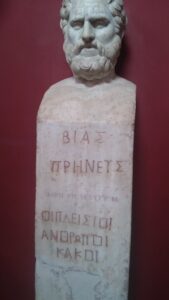
“Love prudence”
“Office will show a man”
“The naïve men are easily fooled”
“All men are wicked”
“Most people are evil”
“It is difficult to bear a change of fortune for the worse with magnanimity”
“Do not speak fast, for that shows folly”
“Choose the course which you adopt with deliberation; but when you have adopted it, then persevere in it with firmness”
“Speak of the Gods as they are”
“They love as if they would one day hate, and hate as if they would one day love”
“Do not praise an undeserving man because of his riches”
“So order your affairs as if you were to live long, or die soon”
“Gain your point by persuasion, not by force”
“I carry all my effects with me”
“Cherish wisdom as a means of traveling from youth to old age, for it is more lasting than any other possession”
Made as Sparta’s ephor, Chilon’s life agreed with his own teaching that is something rare to find. He is also attributed to all of the three Delphic maxims. Chilon is compared to many of the philosophers during his time and it was concluded that even though there were seen to utter the noblest sentiments while still adhering to the basest practices, Chilon was considered a man of integrity who kept his deed, thought, and speech in accordance to one another. Chilon died at Pisa of weakness and joy after he congratulated his son who emerged victorious at the Olympic boxing event.
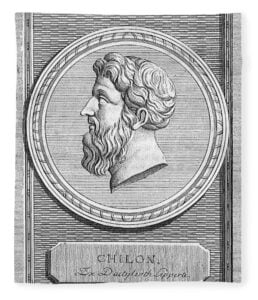
“Obey the laws”
“Do not speak evil of the dead”
“Restrain anger”
“Honor old age”
“Do not dislike divination”
“Prefer punishment to disgraceful gain; for the one is painful but once, but the other for one’s whole life”
“Do not desire what is impossible”
“Do not let one’s tongue outrun one’s sense”
“If one is strong be also merciful, so that one’s neighbors may respect one rather than fear one”
“Do not make too much haste on one’s road”
“Learn how to regulate one’s own house well”
“Do not laugh at a person in misfortune”
Another man who definitely worth to been among the 7 Sages of Ancient Greece is Cleobulus of Lindos. He was often distinguished because of his beauty and strength. It was also believed that Cleobulus was acquainted with the philosophy of Egypt after studying there. He also had a daughter named Cleobulina who became a popular poet, writing riddles using the hexameter verse.
It also seems that Cleobulus wrote the inscription on Midas’ tomb. Cleobulus was the son of a citizen of Lindos in Rhodes and Evagoras. Clement of Alexandria also called him as the king of Lindians while Plutarch referred to him as a tyrant.
It is also said that Cleobulus died at the age of 70.
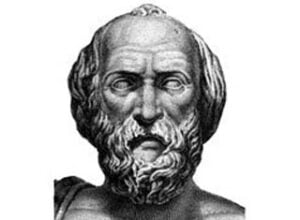
“Moderation is the best thing”
“Do nothing by force”
“Ignorance and talkativeness bear the chief sway among men”
“Avoid injustice”
“Cherish not a thought”
“Be superior to pleasure”
“Do not be fickle, or ungrateful”
“Instruct one’s children”
“Be fond of hearing rather than of talking”
“Be ready for reconciliation after quarrels”
“Seek virtue and eschew vice”
“Be fond of learning rather than unwilling to learn”
Another personality of the 7 Sages Men of Ancient Greece is Pittacus of Mitelene. The career of Pittacus started of him being a disloyal man yet he became successful in defeating the tyrant of Lesbos, seizing the tyrant position for himself.
For the duration of the war between Athens and Mytilene for Achilleis’ territory in Troad, Pittacus was in command of the Lesbians while the Athenians were under the leadership of Phrynon who won in the Olympic. The two agreed to face each other in single combat. It was said that Pittacus slain Phrynon after entangling him using a net he hid under his shield. Through this, Pittacus was able to secure the Mytilene territory.
Pittacus was Lesbos’ tyrant for a decade and within this period, he was known to be an exemplary lawgiver who dealt with the citizens kindly and prevented further wars. Throughout his tyranny, Pittacus passed the law that provided that for offences committed in a drunken state, the penalty will be doubled.
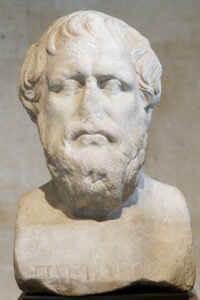
”You should know which opportunities to choose”
”Seize time by the forelock”
”Forgiveness is better than revenge”
”Do not say before hand what you are going to do; for if you fail, you will be laughed at”
”Speak no ill of a friend, nor even of an enemy”
”Whatever you do, do it well”
”Do not reproach a man with his misfortunes, fearing lest Nemesis may overtake you”
”What thou intendest to do, speak not of before thou doest it”
”Know the opportunity”
”Measure a person by what they do with power”
”Do well the duty that lies before you”
”Cultivate truth, good faith, experience, cleverness, sociability, and industry”
”Do not to your neighbor what you would take ill from him”
”That state is best ordered when the wicked have no command, and the good have”
A tyrant of Corinth, Periander landed on Taenaurs while reigning Arion of Methymna. A dolphin brought him to that place and it was said that this event was the most marvelous thing that ever happened to Periander’s life.
There were claims that the rule of Periander started off in milder mode. However, he later interpreted some of the gestures of Thrasybulus, Miletus’ tyrant whom Periander held in high esteem. This interpretation resulted to Periander becoming more bloodthirsty compared to his father. Periander thought that he was counseled by Thrasybulus as the safe way to govern the city to slay Corinth’s most excellent citizens.
This then marked the beginning of the slaughters and banishments all over again, with Periander credited to have stripped naked all of Corinth’s women after his dead wife’s apparition declared that she as naked and cold.
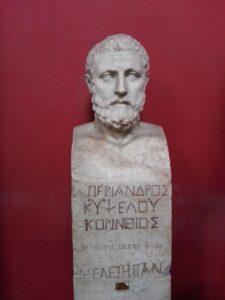
”Because to abdicate it voluntarily, and to have it taken from one, are both dangerous”
”Practice does everything”
”Punish not only those who do wrong, but those who intend to do so”
”Tranquility is a good thing”
”Whatever you agree to do, observe.—Do not divulge secrets”
”Rashness is dangerous”
”Be the same to your friends when they are prosperous, and when they are unfortunate”
”Gain is disgraceful”
”Be moderate when prosperous, but prudent when unfortunate”
”Pleasures are transitory, but honor is immortal”
”Democracy is better than tyranny”
Solon’s legislation is what he is best known for, preventing debt to lead to servitude. There are some who claim that Solon was able to surpass all men during his time in terms of learning and wisdom. As for foreign policy, Solon was the advocate of war against Megara over Salamis Island. He was also a part of the campaigns against Cirrha, a city near Delphi. He was also the one who convinced the Athenians to acquire Thracian Chersonesus, which is peninsula that the Dardanelles separated from Asia Minor.
Solon commanded himself during the war against Megara and he emerged victorious through a stratagem. He then left Athens to go abroad after his legislation was established and spent time with priests from Egypt and it was believed that it was from them that Solon heard about the story of Atlantis.
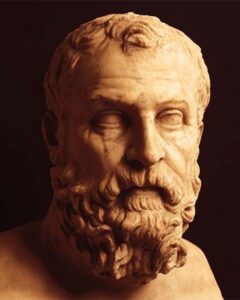
”As I grow older, I constantly learn more”
”Analyze the unknown based on the known”
”The gods are envious and mess things”
”We must help the poor, not encourage idleness”
”Idleness is the mother of all evils”
”Avoid a pleasure which brings sorrow”
”Speech is the mirror of action”
”Prudence is different from the other virtues as much as vision is different from the other senses”
”No fool can be silent at a feast”
The very first one of the Seven called Sage, Thales of Miletus was an astronomer who was often dated by the sun’s eclipse that he was believed to have predicted. It was also the very same eclipse that stopped the war between the Medes and the Lydians. Out of all the 7 Sages of Ancient Greece, Thales is the only one considered by posterity as a man of science or a philosopher. This is why Thales was said to be the first to start the science of natural philosophy.
It is also believed that Thales tried to calculate the sizes of the moon and sun and was the one who divided on year into 365 days. He has also been credited with the geometrical discoveries.

”The most difficult thing in life is to know yourself”
”Water is the first principle of everything”
”All things are full of gods””Time is the wisest of all things that are; for it brings everything to light”
”Avoid doing what you would blame others for doing”
”Nothing is more ancient than God, for He was never created”
”A multitude of words is no proof of a prudent mind”
”Place is the greatest thing, as it contains all things”
”Time is the wisest of all things that are; for it brings everything to light”
How many of the 7 Sages of Ancient Greece did you know? Do you find our article interesting enough? Leave your comments below and do not forget to share on social media or subscribe to our newsletter!
